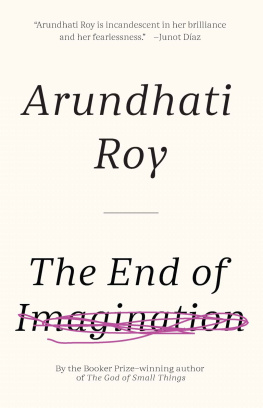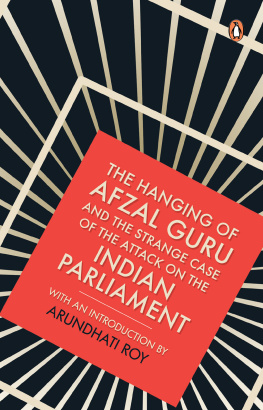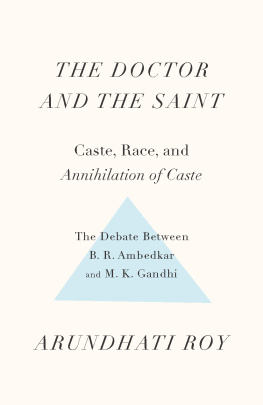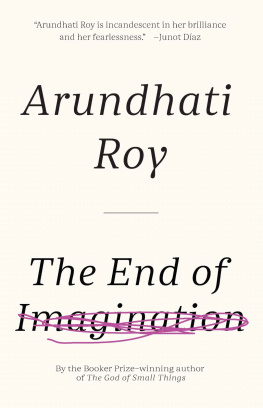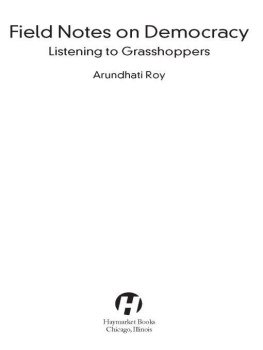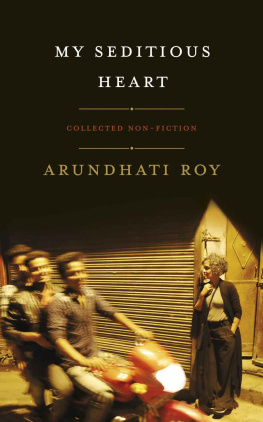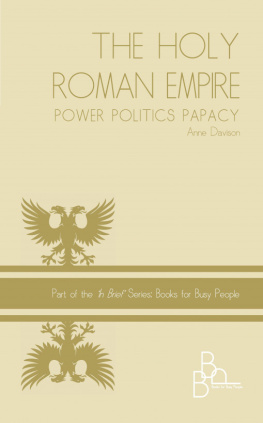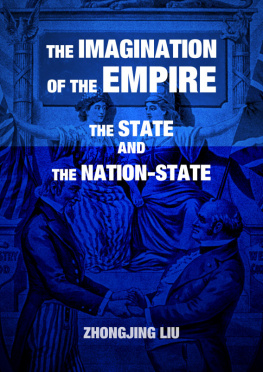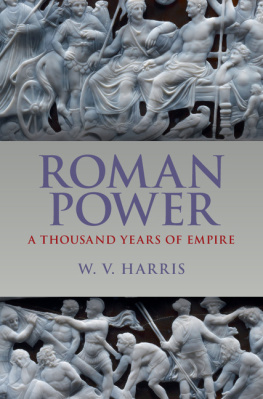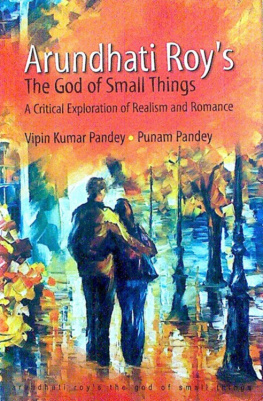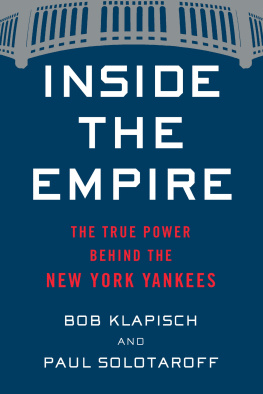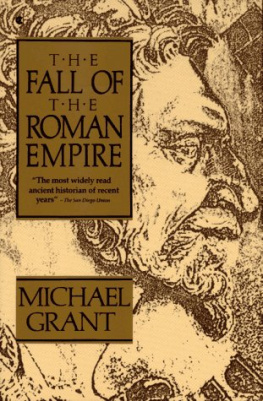Praise for Arundhati Roy:
Arundhati Roy is incandescent in her brilliance and her fearlessness. And in these extraordinary essayswhich are clarions for justice, for witness, for a true humanityRoy is at her absolute best.
Junot Daz
Her incomparable divining rod picks up the cries of the despised and the oppressed in the most remote corners of the globe; it even picks up the cries of rivers and fish. With an unfailing charm and wit that makes her writing constantly enlivening to read, her analysis of our grotesque world is savagely clear, and yet her anger never obscures her awareness that beauty, joy, and pleasure can potentially be part of the life of human beings.
Wallace Shawn
Arundhati Roy combines her brilliant style as a novelist with her powerful commitment to social justice in producing these eloquent, penetrating essays.
Howard Zinn
Arundhati Roy is one of the most confident and original thinkers of our time.
Naomi Klein
The fierceness with which Arundhati Roy loves humanity moves my heart.
Alice Walker
Arundhati Roy calls for factual precision alongside of the real precision of poetry. Remarkably, she combines those achievements to a degree that few can hope to approach.
Noam Chomsky
[Roy is] an electrifying political essayist.... So fluent is her prose, so keen her understanding of global politics, and so resonant her objections to nuclear weapons, assaults against the environment, and the endless suffering of the poor that her essays are as uplifting as they are galvanizing.
Booklist
The notion of Democracy and the pleading for human compassion first came together in Sophocles and the Greek tragedies. More than two thousand years later we live under an economic world tyranny of unprecedented brutality, which depends upon the systematic abuse of words like Democracy or Progress. Arundhati Roy, the direct descendant of Antigone, resists and denounces all tyrannies, pleads for their victims, and unflinchingly questions the tragic. Reflect with her on the answers she receives from the political world today.
John Berger
[Arundhati Roy is] Indias most impassioned critic of globalization and American influence.
New York Times
The scale of what Roy surveys is staggering. Her pointed indictment is devastating.
New York Times Book Review
The End of Imagination
Arundhati Roy

Haymarket Books
Chicago, Illinois
2016 Arundhati Roy
Published in 2016 by
Haymarket Books
P.O. Box 180165
Chicago, IL 60618
773-583-7884
www.haymarketbooks.org
info@haymarketbooks.org
e-book ISBN: 978-1-60846-654-2
Trade distribution:
In the US, Consortium Book Sales and Distribution, www.cbsd.com
In Canada, Publishers Group Canada, www.pgcbooks.ca
This book was published with the generous support of
Lannan Foundation and Wallace Action Fund.
Cover design by Abby Weintraub.
Printed in Canada by union labor.
Library of Congress Cataloging-in-Publication data is available.
10 9 8 7 6 5 4 3 2 1
Contents
My Seditious Heart
An Unfinished Diary of Nowadays
On a balmy February night, aware that things were not going well, I did what I rarely do. I put in earplugs and switched on the television. Even though I had said nothing about the spate of recent eventsmurders and lynchings, police raids on university campuses, student arrests, and enforced flag-wavingI knew that my name was still on the A-list of anti-nationals. That night, I began to worry that, in addition to the charge of criminal contempt of court I was already facing (for interfering in the administration of justice, bashing the Central Government, State Governments, the Police Machinery, so also [the] Judiciary, and demonstrating a surly, rude and boorish attitude), I would also be charged with causing the death of the eternally indignant news anchor on Times Now. I thought he might succumb to an apoplectic fit as he stabbed the air and spat out my name, suggesting that I was a part of some shadowy cabal that was behind the ongoing anti-national activity in the country. My crime, according to him, is that I have written about the struggle for freedom in Kashmir, questioned the execution of Mohammad Afzal Guru, walked with the Maoist guerrillas (terrorists in television-speak) in the forests of Bastar, connected their armed rebellion to my reservations about Indias chosen model of development, and with a hissy, sneering pauseeven questioned the countrys nuclear tests.
Now its true that my views on these matters are at variance with those of the ruling establishment. In better days, that used to be known as a critical perspective or an alternative worldview. These days in India, its called sedition.
Sitting in Delhi, somewhat at the mercy of what looks like a democratically elected government gone rogue, I wondered whether I should rethink some of my opinions. I thought back, for instance, on a talk I gave in 2004 at the annual meeting of the American Sociological Association, just before the Bush-versus-Kerry election, in which I joked about how the choice between the Democrats and the Republicansor their equivalents in India, the Congress and the Bharatiya Janata Party (BJP)was like having to choose between Tide and Ivory Snow, two brands of washing powder both actually owned by the same company. Given all that is going on, can I honestly continue to believe that?
On merit, when it comes to pogroms against non-Hindu communities, or looking away while Dalits are slaughtered, or making sure the levers of power and wealth remain in the hands of the tiny minority of dominant castes, or smuggling in neoliberal economic reforms on the coattails of manufactured communal conflict, or banning books, theres not much daylight between the Congress and the BJP. (When it comes to the horrors that have been visited upon places like Kashmir, Nagaland, and Manipur, all the parliamentary parties, including the two major Left parties, stand united in their immorality.)
Given this track record, does it matter that the stated ideologies of the Congress and the BJP are completely different? Whatever its practice, the Congress says it believes in a secular, liberal democracy, while the BJP mocks secularism and believes that India is essentially a Hindu Rashtra a Hindu nation. Hypocrisy, Congress-style, is serious business. Its cleverit smokes up the mirrors and leaves us groping around. However, to proudly declare your bigotry, to bring it out into the sunlight as the BJP does, is a challenge to the fundamental social, legal, and moral foundations on which modern India (supposedly) stands. It would be an error to imagine that what we are witnessing today is just business as usual between unprincipled, murderous political parties.
Although the idea of India as a Hindu Rashtra is constantly being imbued with an aura of ancientness, its a surprisingly recent one. And, ironically, it has more to do with representative democracy than it does with religion. Historically, the people who now call themselves Hindu only identified themselves by their jati , their caste names. As a community, they functioned as a loose coalition of endogamous castes organized in a strict hierarchy. (Even today, for all the talk of unity and nationalism, only 5 percent of marriages in India cut across caste lines. Transgression can still get young people beheaded.) Since each caste could dominate the ones below it, all except those at the very bottom were inveigled into being a part of the system. Brahmanvaad Brahminismis the word that the anti-caste movement has traditionally used to describe this taxonomy. Though it has lost currency (and is often erroneously taken to refer solely to the practices and beliefs of Brahmins as a caste group), it is, in fact, a more accurate term than Hinduism for this social and religious arrangement, because it is as ancient as caste itself and predates the idea of Hinduism by centuries.

